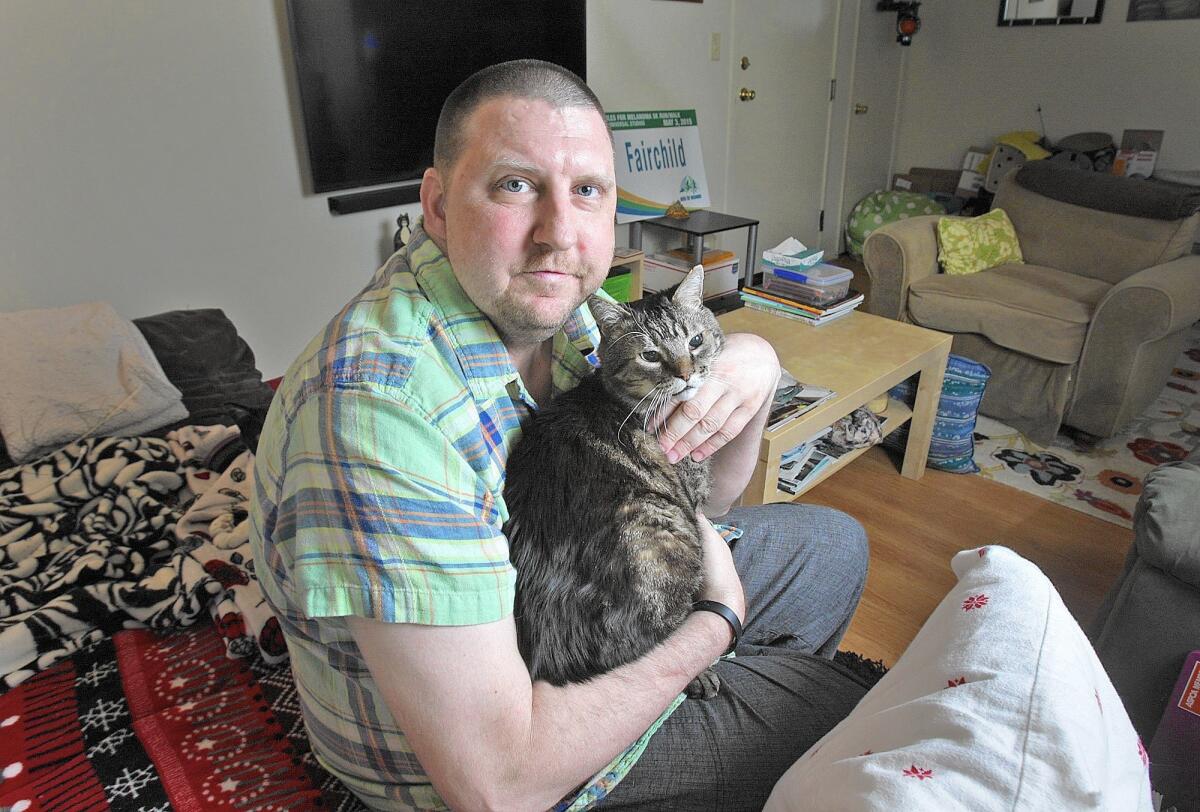Patient sees an option in California’s right-to-die law

Matt Fairchild, 46, rests at his home in Burbank with his cat Jacques on Thursday, March 31, 2016. Fairchild has been living with stage IV melanoma for about two years and experiences some kind of pain throughout his body on a daily basis.
- Share via
Burbank resident Matt Fairchild believes a person should not be brought into the world or leave it alone. If it was up to him, he would want to die in his home sitting next to his wife either watching the first movie they saw together or listening to Jimmy Buffet as the aid-in-dying medication takes its course.
Fairchild, 46, a Navy and Army veteran, was diagnosed with melanoma — the most serious form of skin cancer — in August 2012 and, for about two years, has been living with stage IV of the disease.
There is not a day when Fairchild does not feel some kind of pain all over his body, especially his left side and lower back. He takes about 20 types of prescriptions and over-the-counter medications every day to give him relief. He also gets infusions of a drug called Keytruda, which helps his body fight the tumors.
“I’m taking all of those medications, knowing that I could go to sleep and not wake up,” he said. “I do have tumors dead and alive in my brain and body, so I know it’s a possibility.”
NEWSLETTER: Stay up to date with what’s going on in the 818 >>
Though Fairchild does not have complete control over what his tumors will do, he can soon control when he dies, due to the passage of a new California law.
In March, the state Legislature closed its special session on healthcare, allowing the End of Life Option Act to go into effect on June 9. The new law, signed by Gov. Jerry Brown in October, will let a patient with six months or less to live request aid-in-dying medication.
California will be the fifth state in the country to legalize medical aid in dying. In 1997, Oregon became the first state to enact such a law. Washington, Montana and Vermont have also made it legal for residents to acquire life-ending drugs.
Fairchild said he is “75% to 95%” certain that he will fill out the paperwork and get the medication, which requires patients to make two verbal requests at least 15 days apart as well as a written request witnessed by two people, with one not a relative.
A physician must determine that patients requesting to end their life have the mental capacity to understand and make the request on their own as well as be able to administer the life-ending drug themselves. The doctor is also obligated to have their diagnosis confirmed by a second physician.
Fairchild said that he will begin the process to obtain the aid-in-dying drug when he gets to the point that his body cannot take anymore more treatment or when he decides that he has fought the melanoma long enough.
Though Fairchild is fairly certain he will request the drug, he said he is only about 50% sure about whether he will take it or not.
“It will depend on how things are naturally progressing,” he said. “I am definitely sure that I’m going to fill out the paperwork and have [the drug], because to not have it would be like not taking advantage of something that’s in your toolbox.”
Join the conversation on Facebook >>
Denver, Colo.-based advocacy group Compassion & Choices sees California’s new law in the same light, saying that it is a way for terminally ill patients to have control over how and where they die, said David Grube, the organization’s national medical director who practiced family medicine for 35 years.
“People are realizing that they don’t want to die in an [intensive-care unit] or an institution,” he said. “They want to be at home with their loved ones and want to be able to make some choices rather than put up with the indignities associated with the end of life.”
However, Marilyn Golden, senior policy analyst for the Disability Rights Education & Defense Fund in Berkeley, argues that the new state law does not have any safeguards in place. She said she fears that some people might be coerced into choosing to kill themselves rather than opting to fight their ailment because of the high expense of cancer-treatment drugs.
Golden estimates the aid-in-dying drug will cost several thousand dollars, while seeking specialized long-term treatment “is going to be far greater,” she said.
“We want to see the system improved,” she said. “We don’t want people who are underprivileged, whether they are disabled or can’t pay, to be offered death instead.”
She said she is also concerned that if a physician declines to prescribe the end-of-life drug, a patient might go “doctor shopping,” until they find one who will.
Fairchild said he will not take the aid-in-dying drug “simply to expedite” his death. It will only be when he has exhausted all of his options.
“I would never say that this is to end or shorten the agony of your family and friends,” he said. “It’s not meant for that.”
When that day comes, Fairchild said he will be ready, and so will his wife.
“She’s got no problem when and if that time comes,” he said. “She will not let me sit there and suffer. She’s supportive in that regard, except for the fact that she’s a wife and she has to watch her husband go.”
--
Anthony Clark Carpio, [email protected]
Twitter: @acocarpio
--
ALSO:
City Council eyes land-use change to free up parcel near Bob Hope Airport for development
Burbank middle school counselors take issue with roles as lunchtime supervisors
Burbank will not adopt new method in selecting mayor, vice mayor
